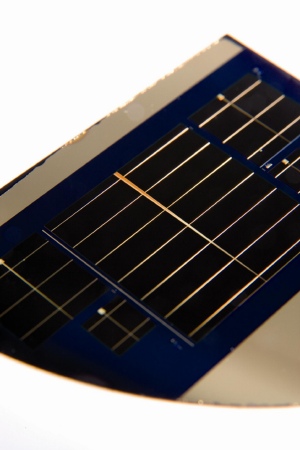Feb 25 2008
IMEC has realized a single-junction GaAs solar cell on a Ge substrate with a record conversion efficiency of 24.7%. The efficiency was measured and confirmed by NREL (National Renewable Energy Laboratory, US). GaAs solar cells are used in satellite solar panels and earth-based solar concentrators.

IMEC realized this record on a single-junction GaAs cell, grown epitaxially on a Ge substrate with an improved micro-defect distribution. The record cell measures 0.25cm2, and shows an efficiency of 24.7%, with an open-circuit voltage (Voc) of 999 mV, a short-circuit current (Jsc) of 29.7 mA/cmcm2, and a fill factor of 83.2%. The cell was made under the ESA-IMAGER project. Umicore, a leading materials technology group, produced the Ge substrate through an optimized manufacturing technology, aimed at improving the intrinsic germanium crystal quality.
Improving the efficiency of this single-junction GaAs cell is a further step in the development of a hybrid monolithic/mechanically stacked triple-junction solar cell. This type of solar cells consists of stacks of solar cells made of different semiconductors, carefully chosen to absorb the solar spectrum as efficiently as possible. Among the many possible combinations, IMEC focuses on stacked cells consisting of top cells with III-V materials and bottom cells made from Ge. With this combination, IMEC is targeting a conversion efficiency of 35% and more. The resulting stacks can be used in satellites and earth-based concentrators, where high-efficiency energy conversion is paramount.